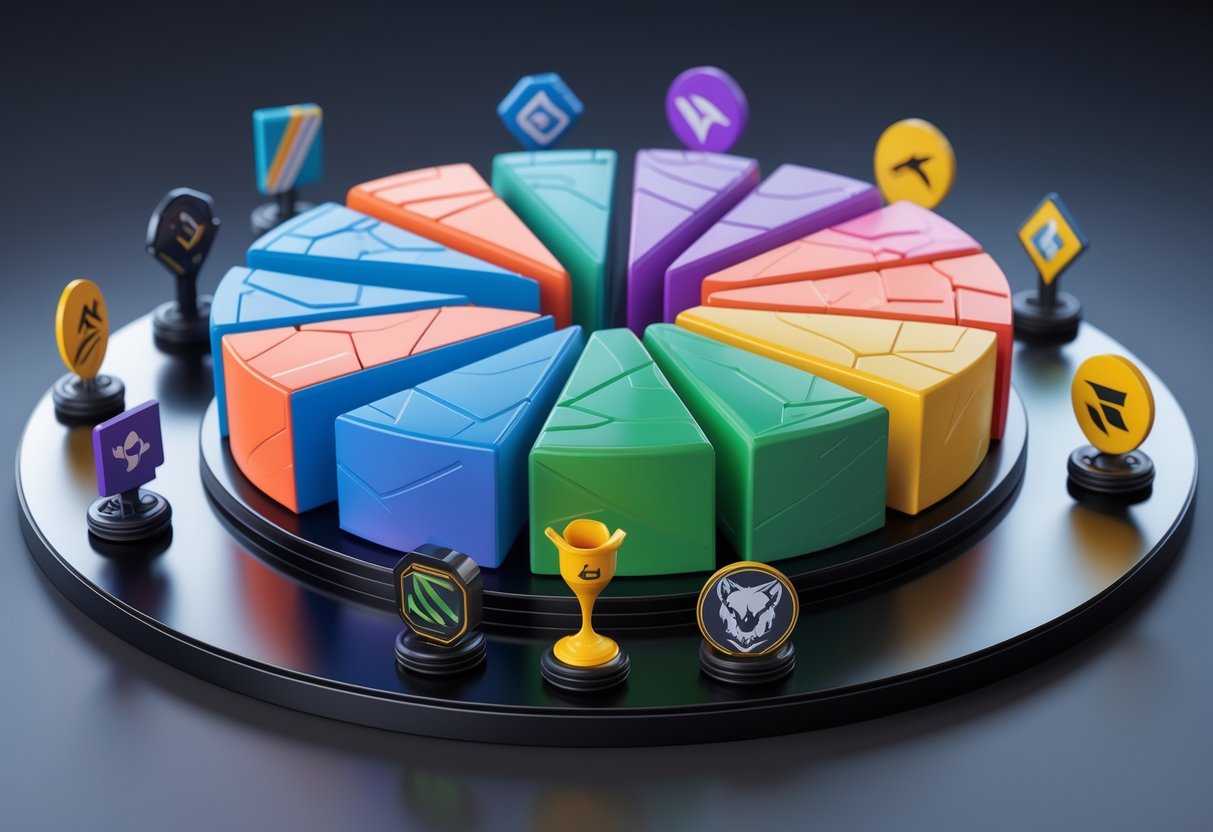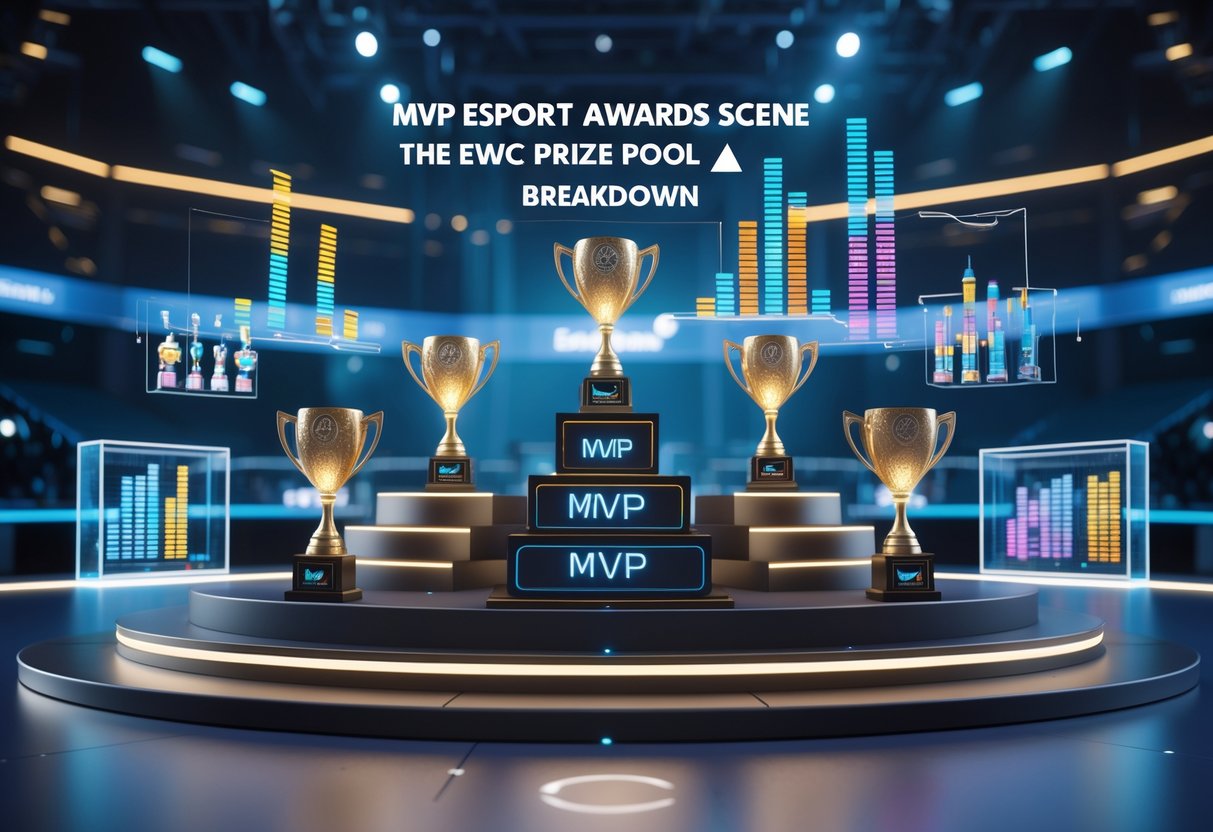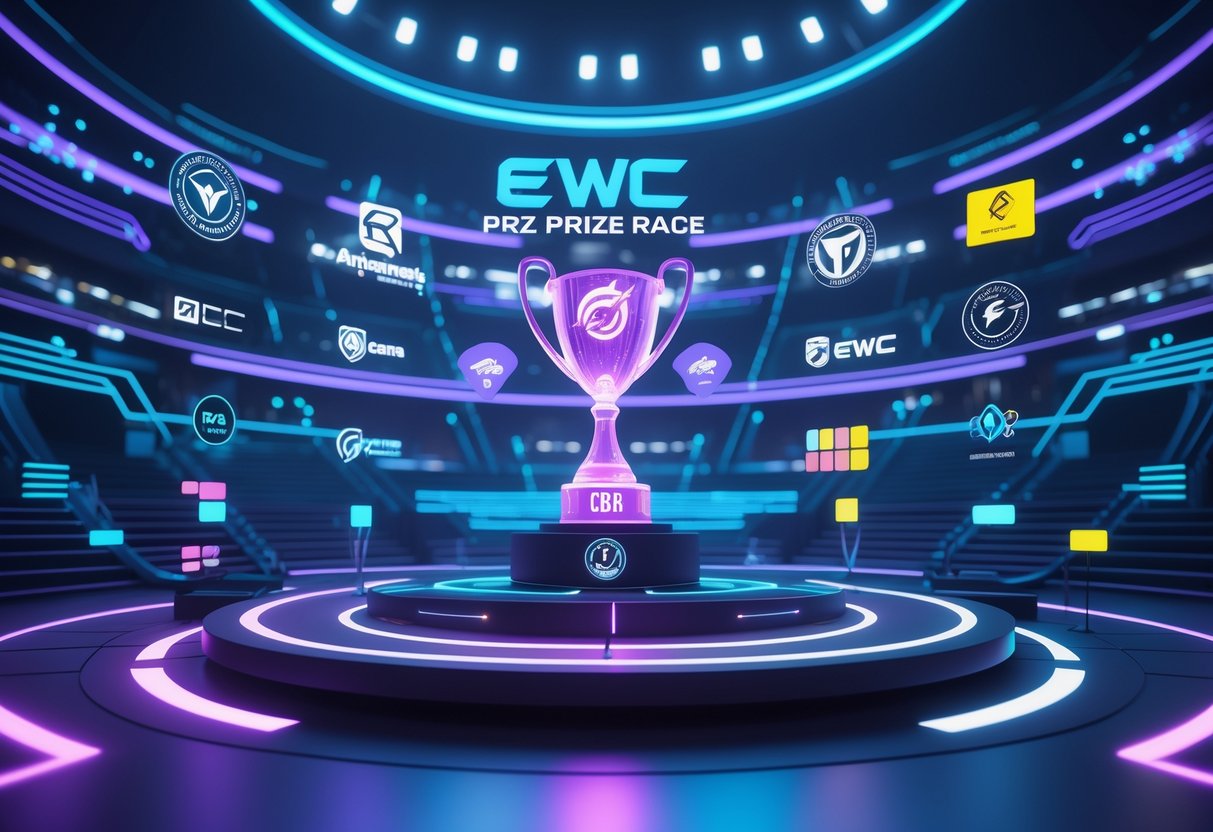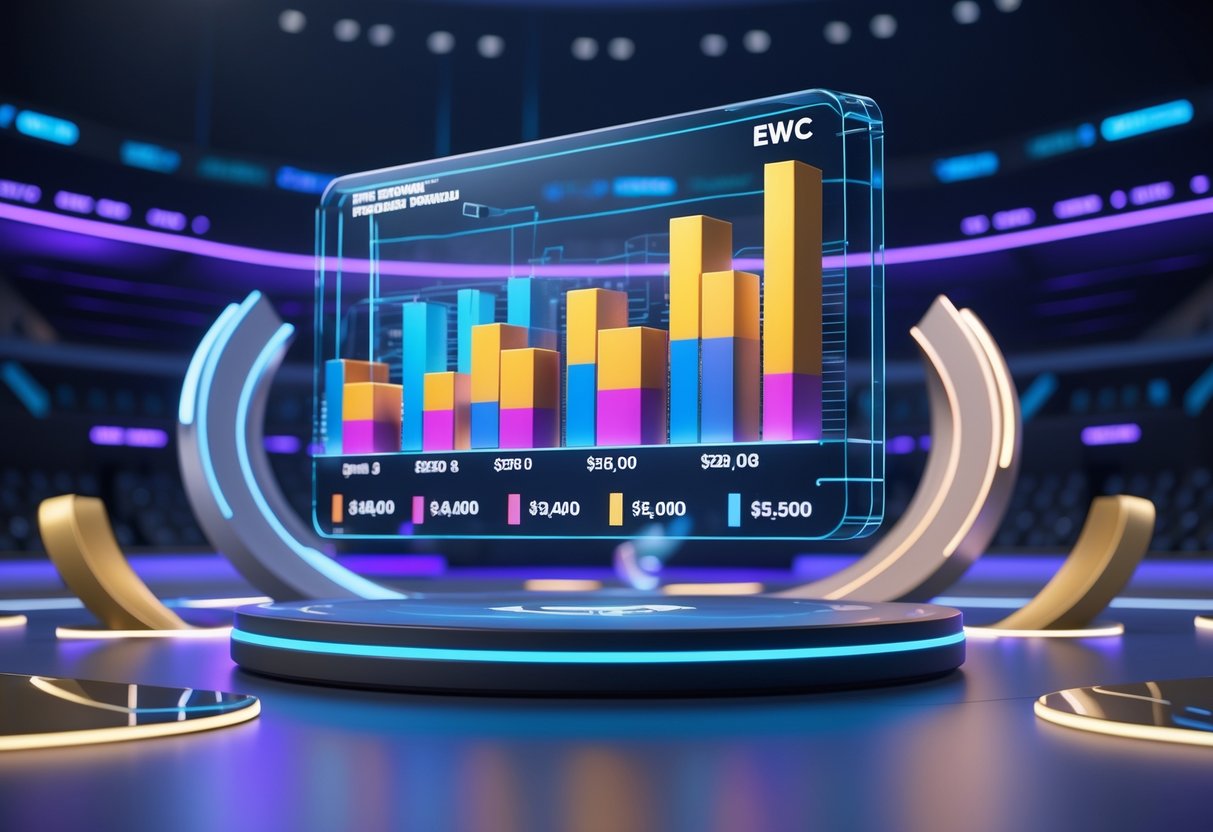EWC Prize Pool Breakdown: Full Details for Every Game in 2025
Updated On: November 29, 2025 by Aaron Connolly
Overview of EWC 2025 Prize Pool
The Esports World Cup 2025 is putting up a record-breaking $70+ million prize pool. That’s the biggest prize pool in competitive gaming so far.
Organisers split this massive sum between tournament winnings and special bonus programs for teams and organisations.
Total Prize Pool Amount
EWC 2025’s prize pool sits at $70.45 million. That’s a new high-water mark for esports events, honestly.
They’ll spread the prize money across 24 different games and tournaments. Each game gets its own chunk, depending on how popular it is and how big its competitive scene looks.
Some individual tournaments offer just a few hundred thousand dollars, while the biggest ones—think League of Legends, Dota 2, and Counter-Strike 2—hand out several million each.
Key Prize Pool Facts:
- Total amount: $70.45 million
- Number of games: 24 tournaments
- Location: Riyadh, Saudi Arabia
- Duration: 7th July – 24th August 2025
Prize Money Growth Compared to Past Years
This year’s prize pool jumps way up from last year. The 2024 Esports World Cup had $60 million on the line, so we’re looking at a $10+ million boost for 2025.
That’s a 17% increase. It really shows how Saudi Arabia keeps pouring resources into competitive gaming.
Prize Pool Growth:
- 2024: $60 million
- 2025: $70.45 million
- Increase: $10.45 million (17%)
With this kind of steady growth, EWC is making itself the top destination for pro esports teams. No other series is even close in terms of prize money.
Prize Pool Categories Explained
Organisers divide the $70.45 million into two main pots: tournament winnings and the Club Share Programme.
Tournament Winnings take up most of the pool. Each of the 24 games gets its own prize money for their competitions.
Club Share Programme adds an extra $7 million for overall team performance. The best-performing organisation across all games wins the EWC Club Champions title and pockets the biggest bonus.
Teams have two ways to earn:
- Win individual tournaments
- Perform well across several games
This setup nudges organisations to spread their talent across multiple titles, not just one.
Game Championship Prize Pools
Tournament prize pools at EWC 2025 add up to £43.45 million across 25 competitions. Four games sit at the top with £3 million each, while a few titles saw their prize pools rise or fall compared to last year.
Top Four Prize Pool Games
Four games grab the top spot with £3 million each. Dota 2 keeps its place, even though its pool dropped by £2 million from last year’s £5 million.
Honor of Kings keeps its hefty funding. It’s one of the biggest mobile MOBAs globally, especially in Asia, and that massive player base really justifies the prize.
PUBG Mobile also gets £3 million. Its global popularity makes it a must-have in the top tier.
Mobile Legends: Bang Bang rounds out the list. It’s huge in Southeast Asia, pulling in massive viewership numbers that make the investment worth it.
| Game | Prize Pool |
|---|---|
| Dota 2 | £3,000,000 |
| Honor of Kings | £3,000,000 |
| PUBG Mobile | £3,000,000 |
| Mobile Legends: Bang Bang | £3,000,000 |
Notable Increases and Reductions
League of Legends doubled its prize pool, going from £1 million to £2 million. That makes sense, given the game’s ongoing popularity.
Rocket League also doubled, now at £1 million. The car-football mashup keeps attracting more fans and viewers.
Counter-Strike 2 went up from £1 million to £1.25 million. That puts it right alongside Valve Major events, at least prize-wise.
Dota 2 actually lost £2 million, dropping to £3 million. Still, it’s tied for the biggest prize pool among all games.
StarCraft II slipped from £1 million to £700,000. Real-time strategy isn’t as big as it once was, but it still has a loyal fanbase.
New Game Additions for 2025
CrossFire jumps in with a massive £2 million prize pool. This FPS gets a big debut as a new EWC title.
Valorant finally joins the list. Riot’s tactical shooter keeps growing and fills the FPS niche alongside Counter-Strike 2.
Chess enters the esports scene here. That’s a twist, right? It’s a classic, but now it’s mixing with the big names.
Fatal Fury: City of the Wolves launches with a £1 million prize pool. It’s a nice boost for the fighting game community.
Call of Duty: Black Ops 6 takes the place of Modern Warfare III. The franchise keeps its spot with new content.
So, Fortnite and Call of Duty: Modern Warfare III drop out from last year’s list.
Prize Pool Distribution by Game

EWC 2025 spreads its $70+ million prize pool across 24 games. Each tournament hands out anywhere from $500,000 up to $3 million, depending on the game’s popularity and competitive scene.
List of Featured Games and Amounts
Prize money varies a lot between games. The biggest tournaments get $3 million each.
Top Tier Games (£3 million each):
- Dota 2
- MLBB Mid Season Cup
- Honour of Kings
- PUBG Mobile
Second Tier Games (£2 million each):
- Apex Legends
- League of Legends
- Rainbow Six Siege
- PUBG: Battlegrounds
- CrossFire
Mid Tier Games (£1-1.8 million):
- Call of Duty: Black Ops 6 (£1.8 million)
- Chess (£1.5 million)
- VALORANT (£1.25 million)
- Counter-Strike 2 (£1.25 million)
Standard Tier Games (£1 million each):
- Fatal Fury: City of the Wolves
- Free Fire
- Overwatch 2
- Call of Duty: Warzone
- EA Sports FC 25
- Tekken 8
- Rocket League
- Street Fighter 6
Entry Tier Games (£500,000-£700,000):
- StarCraft II (£700,000)
- Rennsport (£500,000)
- MLBB Women’s Invitational (£500,000)
- Teamfight Tactics (£500,000)
Insights on Prize Pool Diversity
You can see some clear favourites here. Mobile games grab three of the four highest prize pools.
Classic PC esports like Dota 2 still get top funding. Fighting games land solid £1 million prize pools across the board.
Newer titles like Rennsport and Teamfight Tactics get smaller, but still decent, prize pools. That helps their emerging scenes grow.
The spread means lots of different gaming communities benefit. Console shooters, PC MOBAs, mobile games, and fighting titles all see real investment.
Regional trends matter, too. Games that are big in Asia get bigger prizes, showing the tournament’s global ambitions.
Club Championship Prize Breakdown

The EWC Club Championship hands out £27 million to the top 24 esports organisations. Teams earn points by finishing in the top 8 of individual tournaments, but they’ve got to win at least one event to claim the championship title.
Club Championship Prize Pool Distribution
The top 24 organisations get big payouts. First place takes home £7 million, while even 24th place walks away with £100,000.
Top Prize Positions:
- 1st place: £7 million
- 2nd place: £4 million
- 3rd place: £3 million
- 4th place: £2.5 million
- 5th place: £2 million
Prizes keep going down the line. Even teams in lower spots earn a solid chunk.
Mid-Tier Positions (6th-16th): Payouts range from £1.5 million down to £300,000. That way, plenty of organisations see real rewards for showing up and competing.
Lower Positions (17th-24th): Teams still get between £275,000 and £100,000. It’s a nice incentive for big orgs to field teams in multiple games.
Scoring System and Club Points
Teams rack up EWC Club Points by landing in the top 8 of tournaments. The system rewards squads that stay consistent across different games.
Points Distribution:
- 1st place: 1,000 points
- 2nd place: 750 points
- 3rd place: 500 points
- 4th place: 300 points
- 5th-8th places: 200 points each
Organisations with more teams in more games have a better shot at piling up points. But each roster still has to pull its weight.
Teams that compete in more tournaments can rack up more points. It’s a system that favours the big names with deep rosters.
Winning Conditions for Organisations
To win the Club Championship title, an organisation has to win at least one tournament during the Esports World Cup. Just stacking up second-place finishes won’t cut it.
This rule makes sure the champion actually dominates somewhere, not just by being consistently good. It keeps things competitive and stops teams from winning through steady but unspectacular results.
Team Falcons heads into 2025 as the frontrunner, with 18 confirmed lineups. Team Liquid trails with 11 rosters and hopes to improve on last year’s second-place finish.
Riyadh hosts the championship in July and August 2025. With over 25 tournaments, organisations have to think carefully about where to put their best teams.
Road to EWC Qualifiers and Prize Allocation

The Road to EWC programme hands out over £4 million through qualifying tournaments all over the world. Teams can earn prize money while fighting for spots at the main event in Riyadh.
Qualifier Prize Pool Details
More than $5 million goes to Road to EWC qualifying events. That’s about 7% of the total tournament prize pool.
Organisers spread the qualifier prize money over 200+ tournaments globally. Each event has its own prize breakdown.
Key Prize Categories:
- Individual game qualifiers
- Regional championships
- Partner tournament bonuses
- Performance-based rewards
Rennsport leads the way for individual game qualifiers with a $500,000 pool. Other major titles like PUBG Mobile World Cup grab a chunk as well.
The system gives teams a chance to earn money even if they don’t make it to the main event. That keeps things interesting, doesn’t it?
How Teams Qualify and Earn Prizes
Teams qualify by competing in eligible events run by partnered publishers and organisers. Every one of the 24 games has its own qualification path.
Qualification Routes:
- Partner tournaments – Official events hosted by game publishers
- Regional qualifiers – Area-specific competitions
- Direct invitations – Top-ranked teams get automatic spots
- Last chance qualifiers – The final shot to make it in
Organisers hand out prize money right after each qualifying event. Teams don’t have to wait until the main tournament to collect their earnings.
Big events like the PUBG Mobile World Cup offer the largest payouts. Smaller regional tournaments give emerging teams a real shot at prize money.
Most qualifiers require teams to finish in the top 8 to win prizes. The structure depends on the game and tournament format.
Teams can enter multiple qualifiers for the same game. That means more chances to earn throughout the season.
MVP Awards and Individual Player Prizes

The EWC sets aside $450,000 just to recognise outstanding individual performances. This pool rewards players who stand out, even if their team doesn’t win it all.
Total MVP Prize Fund
The Esports World Cup has exactly $450,000 for MVP awards in 2025. This fund sits separately from the main tournament prizes.
Organisers divide the money among all 24+ games at EWC. Each game probably gets its own MVP share, but they haven’t revealed the breakdown yet.
Prize Distribution Approach:
- Split across multiple game titles
- Awarded to standout individual performers
- Separate from team winnings
- Extra income for top players
Some players carry their teams or deliver moments that really deserve extra recognition. Top fraggers in Counter-Strike, hard-carry players in League of Legends, and clutch artists in fighting games all have a shot at these bonuses.
Criteria for MVP Selection
The EWC hasn’t shared detailed MVP selection criteria yet. Most tournaments use similar methods to pick the standouts.
Typical MVP Factors:
- Statistical performance (kills, damage, objectives)
- Impact on team success
- Clutch plays and game-changing moments
- Consistency across matches
Different games need different measurements. A Rocket League MVP might get picked for saves and assists, while a Street Fighter MVP is all about bracket runs and dominant wins.
Tournament officials, broadcast analysts, or even the community might help select MVPs. Some events mix these methods to keep things fair.
Players can win MVP even if their team doesn’t take the tournament. That gives everyone extra motivation to shine.
Game-by-Game Breakdown and Highlights

EWC 2025 features 25 games, with prize pools ranging from hundreds of thousands up to several million pounds. Counter-Strike 2 and League of Legends still dominate, but new titles like Fatal Fury: City of the Wolves are jumping in, along with old favourites that have evolved.
Games with the Largest Prize Pools
Counter-Strike 2 leads with one of the biggest individual prizes at EWC 2025. This tactical shooter keeps drawing huge investment thanks to its global fanbase and competitive depth.
League of Legends gets another top-tier allocation. Riot’s MOBA stays at the heart of competitive gaming with steady viewership worldwide.
Dota 2 keeps its spot among the top-paying tournaments. Valve’s prize pool system keeps the competition fierce at the highest level.
The top five games make up about 40% of the £70 million prize pool. That concentration shows where the most interest and sponsorships are.
Most of these top games offer over £2 million each. The gap between the biggest games and smaller tournaments is even wider than last year.
Games Making Their Debut in 2025
Fatal Fury: City of the Wolves is the biggest new fighting game for EWC 2025. SNK’s latest entry brings new energy and modern mechanics to the lineup.
Several mobile esports titles are joining for the first time. These aim to reach audiences in regions where mobile gaming rules.
New racing and simulation games are also making an appearance. Organisers hope to draw in viewers who don’t usually watch esports.
Chess comes back as a mind sport, sitting alongside digital competitions. It keeps bridging the gap between traditional and electronic gaming.
Debut games usually start with smaller prize pools, between £100,000 and £500,000, just to see how the audience responds.
Returning Favourites and Changes
Rocket League keeps its spot but with a different prize split. Psyonix’s car-football game still attracts steady interest, even as the market shifts.
VALORANT gets more investment than in 2024. Riot’s shooter is growing its competitive scene around the world.
Organisers dropped several 2024 games for 2025. They’ve focused resources on titles that have proven themselves.
Format changes now affect how prize money is spread out over multiple stages. Many returning games include longer group phases before elimination rounds.
Regional qualifiers for returning games often have their own prize pools. This helps local talent develop before moving up to the main event.
Notable Esports Organisations in the Prize Race

Several big esports organisations are chasing a share of the £52 million prize pool, and Team Falcons is leading the charge. The number of rosters each team puts forward in different games really affects their shot at those Club Championship points.
Top Contenders and Club Rosters
Team Falcons stands out with 18 confirmed lineups across multiple titles. The Saudi Arabian org dominated the 2024 EWC and has the resources to compete just about everywhere.
Team Liquid brings 11 rosters to the 2025 competition. After placing second last year, they’ve expanded to challenge Falcons more seriously this time.
Team Vitality prefers quality over quantity, with strong teams in Counter-Strike 2 and Rocket League. That focused approach could pay off, since you have to win at least one tournament to qualify for Club Championship money.
Other contenders include Natus Vincere, Gen.G Esports, All Gamers, and G2 Esports. Each brings established rosters in different genres.
Teams can’t just dominate one game anymore. They need competitive squads in several titles, from FPS to sports sims.
Impact on Standings
Club points decide the final rankings, with first place earning 1,000 points and 5th-8th place getting 200 points each. Teams with more lineups have more chances to rack up points.
But the “win requirement” rule means you can’t just coast on decent finishes. You have to win at least one tournament to qualify for Club Championship prize money.
That sets up some interesting scenarios. A team with fewer rosters but stronger squads could beat out bigger orgs. Quality matters as much as quantity in the end.
Teams like Team Vitality might do well here, since their focused strategy could lead to more tournament wins instead of spreading themselves too thin.
Regional Highlights: Riyadh and Saudi Arabia

Riyadh hosting the Esports World Cup is a huge move in the global competitive gaming world. Saudi Arabia’s £70 million investment shows they’re serious about becoming a major player in esports.
Host City and Country Significance
Riyadh sits at the heart of Saudi Arabia’s Vision 2030, which aims to diversify the economy away from oil. The Esports World Cup stands as one of the biggest investments in competitive gaming to date.
Saudi Arabia has gone all-in on esports, with massive financial backing and new infrastructure. They’ve hosted smaller events before, but the EWC is their boldest step yet.
Key investments include:
- Modern gaming facilities
- High-speed internet
- Housing for 2,000 elite players
- Broadcast capabilities for a global audience
The timing—July 7th to August 24th—turns Riyadh into the summer hub for competitive gaming. For seven weeks, the city transforms into what some call “the Olympics of esports.”
Saudi Arabia’s approach stands out from traditional hubs like South Korea or the US. Instead of slow, organic growth, they’re using big investments to jump ahead in the industry.
Effect on the Esports Ecosystem
The £70 million prize pool has already sent ripples through global esports. Teams now plan their whole year around the EWC, just like athletes do with the Olympics.
Direct impacts include:
- Player contracts built around EWC qualification
- Bigger sponsorship deals for participating teams
- New training centres opening in various countries
- More global broadcasting partnerships
Other tournament organisers are now rethinking their prize pools. Smaller events struggle to draw top talent during the EWC season.
Regions like Europe and North America have responded by boosting their own investments. The battle for player attention has ramped up since the EWC was announced.
The focus on mobile gaming—especially with PUBG Mobile and Honor of Kings each getting £3 million—signals a shift toward mobile-first esports. That fits Saudi Arabia’s younger audience and global mobile trends.
Awards for Emerging Talent and Community Competitions

EWC 2025 sets aside significant prize money for newcomers and regional communities. Over £5 million supports qualifying events, and £450,000 goes to individual standouts at all levels.
Pathways for Newcomers
The Road to EWC qualifiers mark the biggest investment in grassroots esports yet. More than £5 million is going directly to qualifying tournaments worldwide.
Regional competitions across continents get substantial funding to find rising stars. Publishers and tournament organisers are working with EWC to create real pathways from local scenes to the world stage.
Community tournaments benefit from:
- Direct prize pools for winning teams
- Travel support for top performers
- Equipment and training resources
Many semi-pros say these qualifiers give them their first real shot at pro play. The money means organisers can put on better events and offer meaningful prizes.
Gaming expert James Connolly puts it this way: “These qualifying events create a proper ladder system. Players can see a clear route from their bedroom setup to competing alongside established pros.”
Community Tournaments and Prizes
The £450,000 MVP pool aims at rewarding individual skill, not just team wins. Players who shine—even if their team doesn’t—can earn recognition and cash.
Regional qualifiers get funding based on the strength of their local scenes. Europe usually sees higher investment because of its infrastructure, while emerging regions get development support.
Prize distribution covers:
- Individual skill showcases
- Regional championships
- Cross-game performance bonuses
Players from smaller orgs aren’t locked out. Independent competitors can get noticed and earn money without big sponsors.
This approach helps build sustainable scenes in developing markets. Local tournaments gain credibility by connecting with EWC, but keep their community roots.
Comparisons to Previous Esports Tournaments

The Esports World Cup has bumped its total prize pool from £50 million up to over £56 million for 2025. That’s now the biggest single esports event anywhere—no one else is really close. This boost covers both regular tournament prizes and a club championship format that’s honestly a bit different from traditional competitions.
Year-on-Year Prize Pool Changes
If you look at EWC’s prize pool growth, you’ll spot some clear winners and losers compared to last year. Tournament prizes nudged up slightly, from £34 million to £34.8 million.
But the real leap comes from the club championship rewards, which shot up from £16 million to £21.6 million.
Games with major increases:
- League of Legends doubled its prize, going from £800,000 to £1.6 million.
- Rocket League also jumped, moving from £400,000 to £800,000.
- Counter-Strike climbed to £1 million, so it now matches Valve Major levels.
Games facing cuts:
- Dota 2 dropped hard—from £4 million down to £2.4 million.
- StarCraft II fell from £800,000 to £560,000.
Five new games joined the lineup this year, including Valorant and Chess. Meanwhile, Fortnite and Call of Duty: Modern Warfare III didn’t make the cut this time.
EWC now caps the top individual tournament prizes at £2.4 million. Four games hit that ceiling: Dota 2, Mobile Legends: Bang Bang, Honor of Kings, and PUBG Mobile.
EWC’s Unique Prize Format
Most esports tournaments stick to match winnings, but EWC does things differently with its two-part system. Teams fight for both tournament wins and club championship points, which lead to extra prizes.
Standard tournament format:
- Direct prize money for placements.
- Winner takes the biggest share.
- Usually focuses on just one game.
EWC’s club system:
- Teams earn points in different games.
- Orgs get rewarded for having strong rosters across several titles.
- There’s a separate £21.6 million prize pool just for this.
This setup pushes teams to spread out and invest in more games, not just specialize in one. Big orgs like Team Liquid or Fnatic can really benefit if they’re strong in multiple titles at once.
Honestly, it feels a bit like traditional sports leagues, where clubs compete for overall standings, not just single matches. Investors seem to like this broader approach since it gives them more exposure across the whole esports scene.
Frequently Asked Questions

EWC 2025 is rolling out a record-breaking $70+ million prize pool, split across 25 tournaments. The breakdown covers the Club Championship, individual games, and MVP awards. Fans are pretty curious about how the money splits up for each game and position.
How is the EWC 2025 prize pool distributed among winners?
EWC 2025 splits its $70+ million prize pool into several categories. The Club Championship gets the biggest chunk at $27 million, and the winning club grabs $7 million.
All 25 individual game championships share over $38 million, but the amount for each game depends on things like viewership and how big the scene is.
MVP awards account for $450,000 total, going to standout players across all tournaments. The Road to EWC qualifiers get over $5 million for regional and qualifying events.
The top 16 clubs in the Club Championship divide up the $27 million pool based on their performance across games. The amount drops from first place down to 16th.
Can you tell me the portion of the prize dedicated to the EWC 2025 Mobile Legends: Bang Bang champions?
Mobile Legends: Bang Bang is definitely one of the 25 tournaments at EWC 2025. The exact prize pool for this game hasn’t been made public yet.
It falls under the $38+ million set aside for all game championships. Mobile Legends usually gets a solid prize pool at major esports events because of its massive fanbase.
We’ll probably see the exact breakdown announced closer to July, when the tournament happens. Past EWC tournaments have handed out big rewards for mobile esports titles.
What are the financial rewards for the runners-up in the CS event at EWC 2025?
Counter-Strike 2 is on the list for EWC 2025, taking over from CS as the main Counter-Strike event. The prize details for each finishing spot haven’t been revealed just yet.
Usually, Counter-Strike tournaments pay runners-up pretty well—sometimes 30-50% of what the winners get. At big events, second place teams can walk away with hundreds of thousands of pounds.
We’ll probably get the exact CS2 prize breakdown when EWC releases more info for each game. Counter-Strike still stands as one of the highest-paying esports titles out there.
Are there any details available about the prize divisions for the EWC 2025 PUBG competition?
PUBG BATTLEGROUNDS and PUBG Mobile both made the EWC 2025 lineup, so there are two separate tournaments with their own prize pools. Neither game’s exact prize breakdown is out yet.
Both versions add to the $38+ million total for game championships. Mobile and PC usually get different amounts, depending on where they’re most popular.
PUBG tournaments tend to spread the prize money across lots of finishing spots, not just the winners. We expect more details to drop before July.
Could you inform me about the prize money allocation for Valorant teams in EWC 2025?
Valorant is making its first appearance at EWC in 2025, one of four new games in the mix. The prize pool for Valorant hasn’t been announced yet.
With its global crowd and Riot Games backing, Valorant will probably get a hefty slice of that $38+ million pool. Riot’s recent partnership with EWCF points to some serious investment.
The prize structure will likely reward several teams, not just the champs. We’ll get the official numbers before July, once EWC shares the details.
How does the EWC 2025 prize structure for the Dota 2 tournament differ from previous years?
Dota 2’s making its return to EWC in 2025, after showing up at the first event in 2024.
Organizers haven’t revealed the exact prize amount for Dota 2 in 2025 yet.
They bumped up the overall EWC prize pool by $10 million compared to 2024, so it’s safe to guess that most individual game prizes—including Dota 2—will get a boost.
Dota 2 usually lands a hefty chunk of prize money at big tournaments.
If anything changes, it’ll probably be about how they split up the prize, not the total sum.
The 2024 Dota 2 tournament stuck to the usual formats.
Chances are, we’ll see something similar in 2025.

